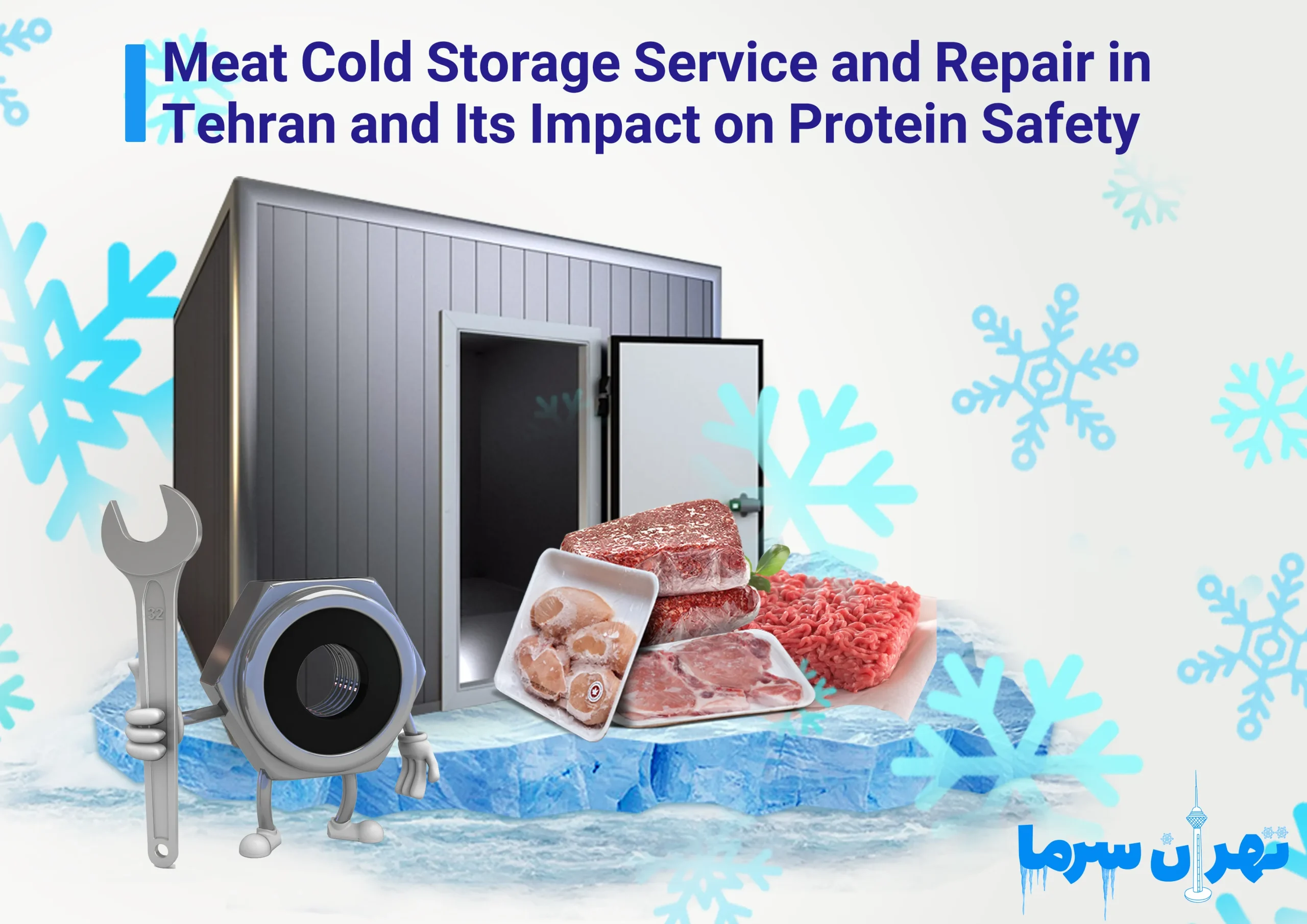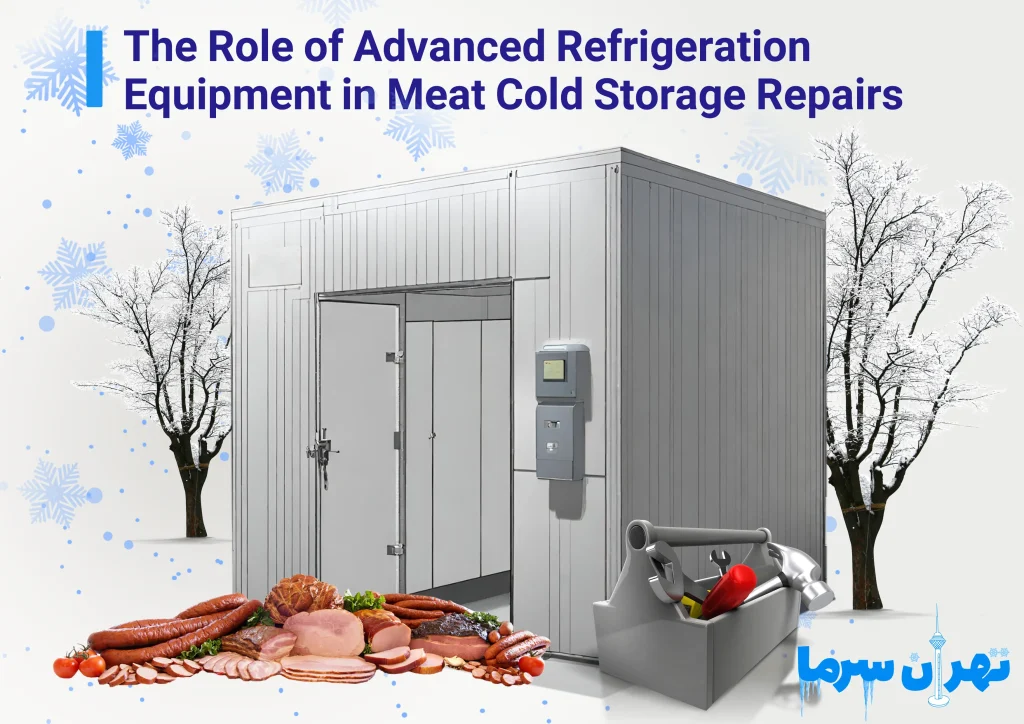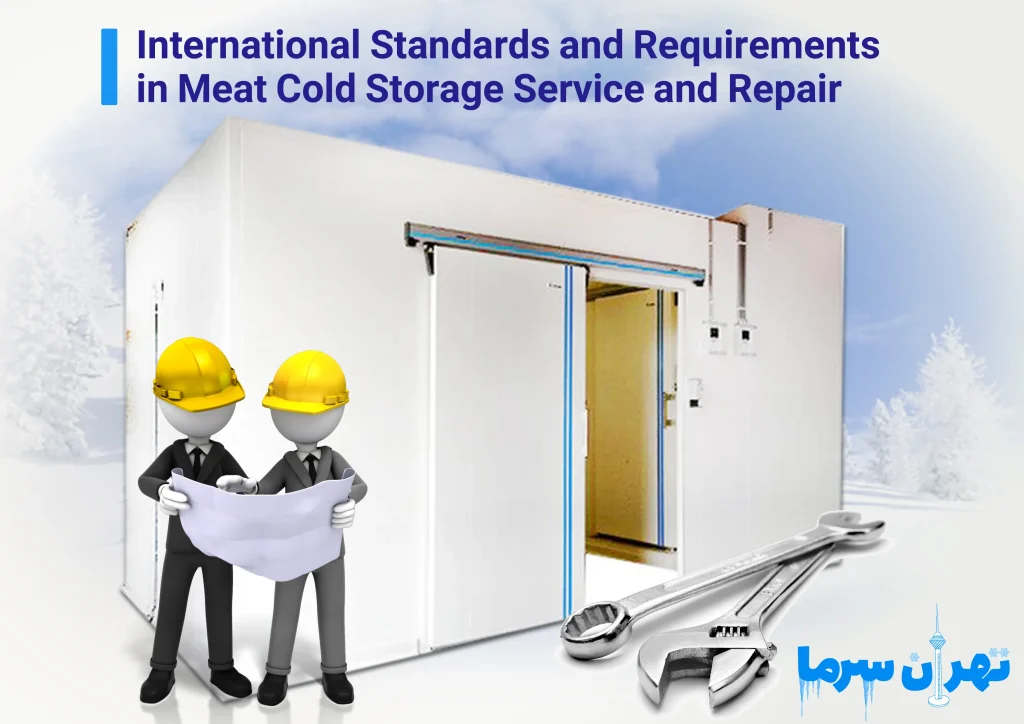Meat Cold Storage Service and Repair in Tehran and Its Impact on Protein Safety

Meat cold storage service and repair is considered an essential measure for maintaining the efficiency of refrigeration systems. Regular maintenance of meat cold storage reduces ancillary costs and extends the lifespan of equipment. Additionally, meat cold storage service and repair in Tehran, thanks to specialized centers and skilled technicians, quickly meets the needs of the food industry and large retail stores.
One of the direct effects of meat cold storage service and repair in Tehran is ensuring that the temperature remains within the standard range for meat storage. Any temperature fluctuations can lead to rapid bacterial growth and reduced product quality.
As a result, regular cold storage servicing—which includes checking the performance of compressors, condensers, evaporators, and control systems—plays a key role in preventing microbial contamination. This is particularly important for distribution centers and large food stores in Tehran that store significant volumes of meat.
In addition to temperature control, timely repair of worn-out parts in the cold storage also prevents sudden problems. Unexpected failures can lead to a complete shutdown of the refrigeration system, and in a city like Tehran, where the meat supply chain moves rapidly, this can result in severe financial and health damages.
Therefore, meat cold storage service and repair in Tehran is not merely a technical task; it is a necessity to ensure the safety and quality of protein products throughout the production and distribution cycle.
Paying attention to meat cold storage service and repair in Tehran not only prevents spoilage and wastage of protein products but also builds consumer trust. When customers are confident that meat products are stored under optimal conditions, their loyalty to the store or supplier increases. Hence, investing in specialized cold storage services can also be viewed as an investment in food safety and business sustainability.
The Role of Advanced Refrigeration Equipment in Meat Cold Storage Repairs
The role of advanced refrigeration equipment in meat cold storage repairs is far more extensive than it may seem at first glance. Meat cold storage is one of the main links in the protein food supply chain, and the safety of these products is directly related to the quality of refrigeration equipment used.
Using modern technology in refrigeration equipment not only makes meat storage safer and more hygienic but also significantly reduces costs associated with frequent failures and decreased system efficiency. Therefore, when it comes to meat cold storage repairs, the use of advanced refrigeration equipment is an unavoidable necessity.
One of the most important advantages of modern refrigeration equipment in meat cold storage repairs is precise temperature and humidity control. Today’s smart and digital systems can continuously monitor the environmental conditions inside the cold storage and send alerts in case of any fluctuation or error.
This feature helps technicians identify potential problems before they escalate into serious failures during repair or servicing. As a result, meat remains under stable and hygienic conditions throughout storage, minimizing the risk of bacterial growth or product spoilage.
Moreover, advanced equipment such as inverter compressors, energy-efficient condensers, and optimized evaporator systems plays an important role in energy savings and reducing cold storage wear and tear. This aspect is particularly significant during meat cold storage repairs because the more modern and efficient the components, the less need there is for major repairs, and the overall system lifespan increases.
In addition, technicians dealing with service or replacement of parts encounter equipment designed for easier access and maintenance, reducing system downtime and disruptions in the meat storage chain.
Another important aspect of advanced refrigeration equipment in meat cold storage service and repair is its capability to connect to monitoring and remote control systems. This technology allows technical experts to supervise the cold storage status without being on-site and provide immediate solutions if any issues are detected.
In some cases, repairs are managed intelligently, and certain system settings or resets can be performed remotely. This capability is especially strategic in large, high-demand cities like Tehran, where massive volumes of meat are stored in cold storage facilities.
The role of advanced refrigeration equipment in meat cold storage repairs is not limited to the technical dimension; it directly impacts food safety, public health, and even the economy of related businesses. The more modern technologies are applied in the design and repair of meat cold storages, the higher the consumer confidence in product quality.
This not only ensures public health but also elevates the market standing of companies and centers storing protein products. Therefore, utilizing advanced refrigeration equipment in meat cold storage repairs can be considered a long-term, sustainable investment with benefits manifesting across multiple levels.
Energy Optimization Through Meat Cold Storage Service and Repair
Energy optimization through meat cold storage service and repair is one of the key topics in the protein storage and distribution industry. Cold storage facilities are among the installations that consume significant energy due to continuous operation and the need to maintain stable temperature conditions.
If this equipment is not regularly serviced and repaired, its efficiency decreases, which in turn leads to a significant increase in electricity consumption. Therefore, performing meat cold storage service and repair is not only important for extending the lifespan of devices and preserving meat quality but also a fundamental factor in reducing energy costs.
When a meat cold storage facility is properly serviced, components such as compressors, condensers, evaporators, and fans operate under optimal conditions. Cleaning condensers and evaporators, timely refrigerant charging, and proper adjustment of control systems ensure that less energy is consumed to reach the desired temperature.
In contrast, cold storage facilities that neglect periodic maintenance often face issues such as excessive compressor pressure, longer motor running times, and consequently higher energy consumption. Therefore, meat cold storage service and repair can be considered an effective measure to improve energy efficiency and reduce operational costs.
Another important point is that by using modern methods in meat cold storage repair, equipment can be optimized to operate according to environmental conditions and storage load. For instance, using smart control systems and variable-speed compressors along with specialized repairs allows energy consumption to be significantly reduced. This is particularly important in cities like Tehran, where energy costs are high and the volume of meat stored is substantial.
Ultimately, energy optimization is not only an economic benefit for business owners but also directly impacts environmental sustainability and carbon footprint reduction. The more professionally and systematically meat cold storage service and repair is conducted, the less energy is wasted, enabling more efficient use of energy resources on a larger scale.
Thus, it can be said that meat cold storage repair acts as a bridge between improving equipment efficiency, reducing costs, protecting the environment, and enhancing the quality of protein products.
Common Technical Challenges in Industrial Meat Cold Storage Service and Repair
Common technical challenges in industrial meat cold storage service and repair mostly stem from the complexity and high sensitivity of refrigeration systems and protein storage. One frequent issue is temperature fluctuations, which can result from compressor failures, blocked refrigerant lines, or malfunctions in temperature sensors, rapidly affecting meat quality.
In addition, wear and tear of mechanical components such as fans, valves, and connectors is another typical challenge that, if not identified and repaired on time, can lead to complete system shutdown. Many industrial cold storages also face problems like frost and ice accumulation in evaporators, which reduce equipment performance and require specialized repair and thorough cleaning.
On the other hand, using advanced equipment and digital control systems, while offering many advantages, requires high technical knowledge and familiarity with software and control protocols. Therefore, industrial meat cold storage repairs not only involve mechanical and refrigeration activities but also require specialized skills in technology and intelligent system management.
All these challenges indicate that industrial meat cold storage service and repair is a multidimensional and sensitive process that requires experience, precision, and organized planning to maintain equipment quality, safety, and energy efficiency.
International Standards and Requirements in Meat Cold Storage Service and Repair
International standards and requirements in meat cold storage repairs play a crucial role in ensuring the quality, safety, and hygiene of protein products. Adhering to these standards means following precise maintenance and repair procedures for refrigeration equipment according to technical guidelines, preventing food spoilage, and reducing health risks. For example, international requirements include precise temperature and humidity control, the use of approved parts and refrigerants, and documentation of all service and repair activities to quickly detect and correct any errors or lapses in the cold chain.
Furthermore, standards emphasize that repairs and maintenance must be performed by trained and qualified technicians, and the tools and equipment used must comply with manufacturer guidelines and international regulations. Following these principles not only ensures the safety of protein products but also increases cold storage lifespan, reduces energy consumption, and improves operational efficiency.
Ultimately, adhering to international standards in meat cold storage service and repair strengthens consumer and regulatory trust and elevates the standing of protein storage centers in domestic and international markets.
?Why Choose Tehran Sarma Engineering Company for Meat Cold Storage Service and Repair
For meat cold storage service and repair, turning to Tehran Sarma Engineering Company can guarantee specialized, professional, and high-quality services. The company, leveraging an experienced and trained team in industrial refrigeration equipment, is capable of performing all stages of meat cold storage service and repair accurately and in accordance with technical standards. Using genuine parts and advanced equipment alongside extensive experience ensures that failures are properly addressed and cold storage performance is optimized.
Moreover, Tehran Sarma provides fast services and continuous support, reducing system downtime and preventing quality degradation of the meat. Ultimately, choosing this company not only ensures the safety and health of protein products but also helps reduce energy costs, extend equipment lifespan, and improve operational efficiency.
For more information about cold storage repairs, you can visit Tehran Sarma’s website or contact them at 09121906418 and 02177972256.
In conclusion, meat cold storage service and repair is not only crucial for preventing costly breakdowns and reducing energy wastage but also plays a key role in maintaining the safety of protein products. Selecting reputable centers for meat cold storage repairs and utilizing specialized service in Tehran gives businesses confidence that their equipment will always operate at optimal performance.
Source: https://cool-tec.co.uk/




 سردخانه
سردخانه برق
برق کمپرسور
کمپرسور کمپرسور بیتزر
کمپرسور بیتزر کمپرسور کوپلند
کمپرسور کوپلند کمپرسور بوک
کمپرسور بوک کمپرسور دانفوس
کمپرسور دانفوس کمپرسور منیروپ دانفوس
کمپرسور منیروپ دانفوس کمپرسور امبراکو
کمپرسور امبراکو کمپرسور پاناسونیک
کمپرسور پاناسونیک کمپرسور سابکول
کمپرسور سابکول کمپرسور کوپلند
کمپرسور کوپلند کمپرسور اسکرال کوپلند
کمپرسور اسکرال کوپلند کمپرسورفراسکلد
کمپرسورفراسکلد کمپرسور رفکامپ
کمپرسور رفکامپ کمپرسور اسکرال دانفوس
کمپرسور اسکرال دانفوس گاز مبرد
گاز مبرد گاز R22
گاز R22 گاز R134
گاز R134 گاز R404
گاز R404 گاز R407
گاز R407 گاز R410
گاز R410 گاز R508
گاز R508 کندانسور هوایی
کندانسور هوایی اواپراتور
اواپراتور اواپراتور آرشه
اواپراتور آرشه اواپراتور صابکول
اواپراتور صابکول اواپراتور آسه
اواپراتور آسه اواپراتور نیک
اواپراتور نیک اواپراتور آرتک
اواپراتور آرتک اواپراتور نوین
اواپراتور نوین اواپراتور تبادل کار
اواپراتور تبادل کار درب
درب ساندویچ پنل
ساندویچ پنل فن سردخانه
فن سردخانه روغن کمپرسور سانیسو
روغن کمپرسور سانیسو متعلقات سردخانه
متعلقات سردخانه